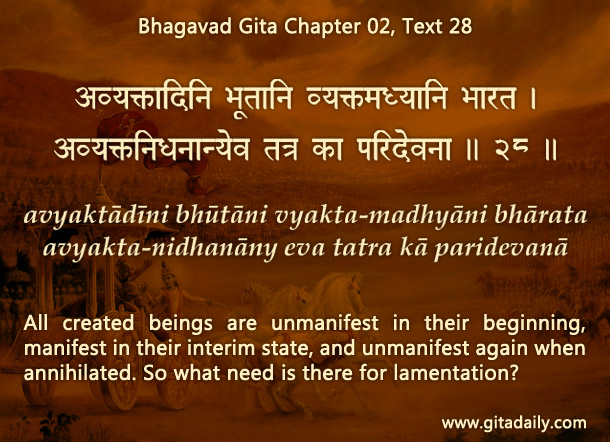Foreign refers to that which despite its differences is essentially similar to us – foreigners are, after all, humans like us; they breathe air, eat food and need sleep. In contrast, alien refers to that which is radically different from us – aliens may well have bodies and bodily needs substantially distinct from ours, as science fiction depicts sometimes.
The Bhagavad-gita begins by declaring that we are souls different from our material bodies. The matter that comprises our bodies is, for us souls, not just foreign, but alien. While we are sat-cit-ananda (eternal, conscious and blissful), our body is asat-acit-niraananda (temporary, insentient and devoid of happiness). Our misidentification with the alien material body subjects us to the miseries of disease, old age, death and rebirth. By underscoring our spiritual identity, the Gita (02.28) helps us to see material transformations, including our body’s deterioration and destruction, as inconsequential.
Some religious traditions consider the body and the soul non-differentiable. Consequently, they often conceive of the afterlife as centered on resurrection of the body, with heaven essentially being a perennial family reunion. However, such transposition of temporary relationships to eternity leads to incoherence. In heaven, will old grandparents be eternally old? Would that be a heavenly prospect for them? If instead everyone were always youthful, how will inter-generational relationships be possible? Will a grandfather and a granddaughter be of the same age? For how many generations up and down will relatives be coeval?
More detrimentally, the conflation of body and soul keeps our focus in the afterlife on us and our bodily relatives instead of on God, who is the ultimate embodiment and fulfillment of our heart’s longing for love.
By its message of radical body-soul duality, the Gita saves us from simplistic fancies about the afterlife and thus prepares us for pure spiritual love for God.

Explanation of article:
Podcast:

Hare Krishna Prji, PAMHO
Wonderful article. On a lighter note, in addition to the invaluable lessons, I also learn a few new words everyday as a result of these articles. I’ve sometimes noticed some viewers finding it difficult with the vocabulary.
There’s a nice extension I use for Google Chrome – Google Dictionary:
https://chrome.google.com/webstore/detail/google-dictionary-by-goog/mgijmajocgfcbeboacabfgobmjgjcoja?hl=en
On double clicking any word (indeed, just selecting a word), a small window pops up with it’s meaning. Other users should also find this extension useful.
Thank You.
Thanks for sharing this.
ys
ccdas